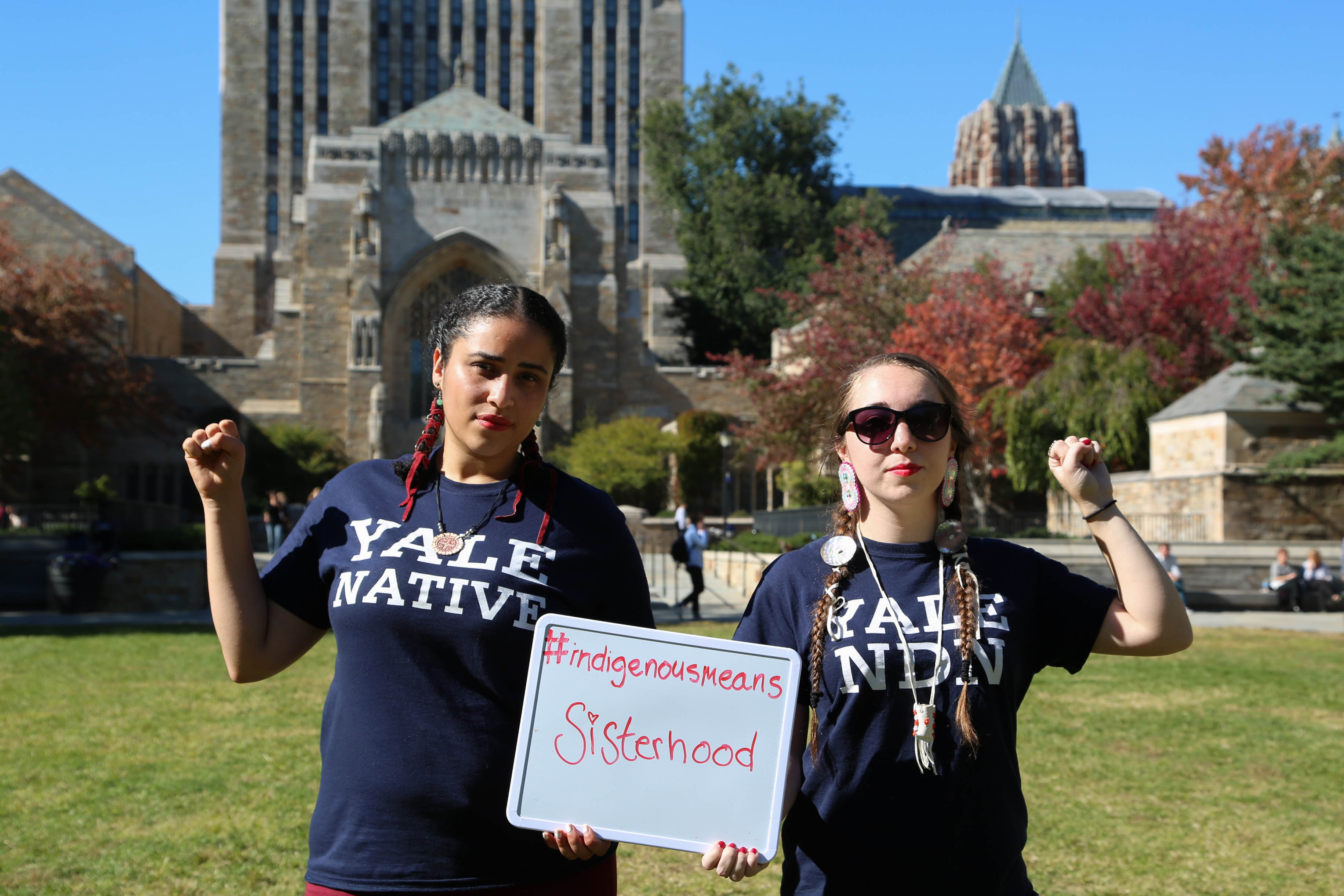
On a crisp and clear autumn afternoon this past Sunday, members of the Yale and New Haven communities gathered on the New Haven Green to kick off a two-day celebration of Indigenous People’s Day. This year, organizers emphasized a broader definition of native identity that included indigenous Latin American and Hawaiian as well as Native American people.
Adorned in traditional native garments, participants proudly carried signs that reclaimed indigenous history in the face of colonial imperialism. In particular, the posters denounced the legacy of Christopher Columbus, who was honored by a national holiday Monday. “Raining on his parade,” “The Nina, Pinta, Santa Maria and Genocide” and “Indigenous solidarity” were just a few of the signs that bore testimony to native people’s fight for recognition during a holiday that, for some, has historically served as a reminder of the massacre of millions of Native Americans. During the event, as well as over the course of the two-day celebration, organizers focused on inclusivity within the native community despite the significant amount of diversity within the group.
“What a lot of people don’t understand about the native community at Yale is that it’s very diverse,” said Sebastian Medina-Tayac ’16, president of the Association of Native Americans at Yale and a staff reporter for the News. “We are as linguistic and culturally diverse as any other culture. It’s a lot of people coming together predicated on the idea of survival, which is radical in and of itself.”
The goal of Indigenous People’s Day was to celebrate the survival and resilience of indigenous people across the Western hemisphere. Events focused on weaving indigenous foods, dances and voices from different groups within Yale and New Haven into a more comprehensive picture of native culture.
Medina-Tayac described how the events hoped to transcend barriers across cultures and communities.
“It’s about sharing our cultures and bringing our cultures together,” he said. “This idea of unity is about bridging the native community of Yale and the native community of New Haven, including refugees that come from south of the border and speak another language. It’s important for us to reach out with Unidad Latina [en Accion]to people who stay true to their language. The southern border is a colonial construction.”
The Association of Native Americans at Yale has worked closely with Unidad Latina en Accion — an organization that fights for the human and labor rights of immigrants in New Haven — as well as La Casa Cultural to be inclusive of all indigenous people in North America.
La Casa hosted a community feast on Sunday featuring a blend of Native, Hawaiian and Latin American foods. Towering pots of dry meat soup and Mexican hot chocolate were quickly consumed along with trays of orange rice, chiles and haupia, a traditional Hawaiian dessert.
At a Sunday dinner event that was part of the Indigenous People’s Day celebrations, John Jairo Lugo, an activist with Unidad Latina en Accion, said Mexican history is closely interwoven with the history of American Indians, and he encouraged both groups to learn from one another.
“The event was very important because it was an opportunity for Mexican refugees to encounter American Indians,” he told the News. “We share the same story and the same continent, and we think it’s time to break down the barriers and find ourselves as pueblos inside and on the same continent. This is just the beginning and needs to grow.”
Beyond expanding the definition of indigenous people, event organizers also grounded the celebrations in the idea that their people are still here and will continue to resist oppression. At a round dance demonstration on Cross Campus Monday afternoon, members chanted, “We’ll take back what we want. We’ll take back what we had.”
Alanna Pyke ’19, who is involved with the Association of Native Americans at Yale, said the indigenous people have proven their resilience many times over the years.
“Indigenous People’s Day is a day to remember our ancestors and the histories of all indigenous peoples,” she said. “This day shows that the colonial policies that were started by Columbus have not gone away.”
The idea for an indigenous people’s day in place of Columbus Day first arose at a United Nations conference in 1977.







